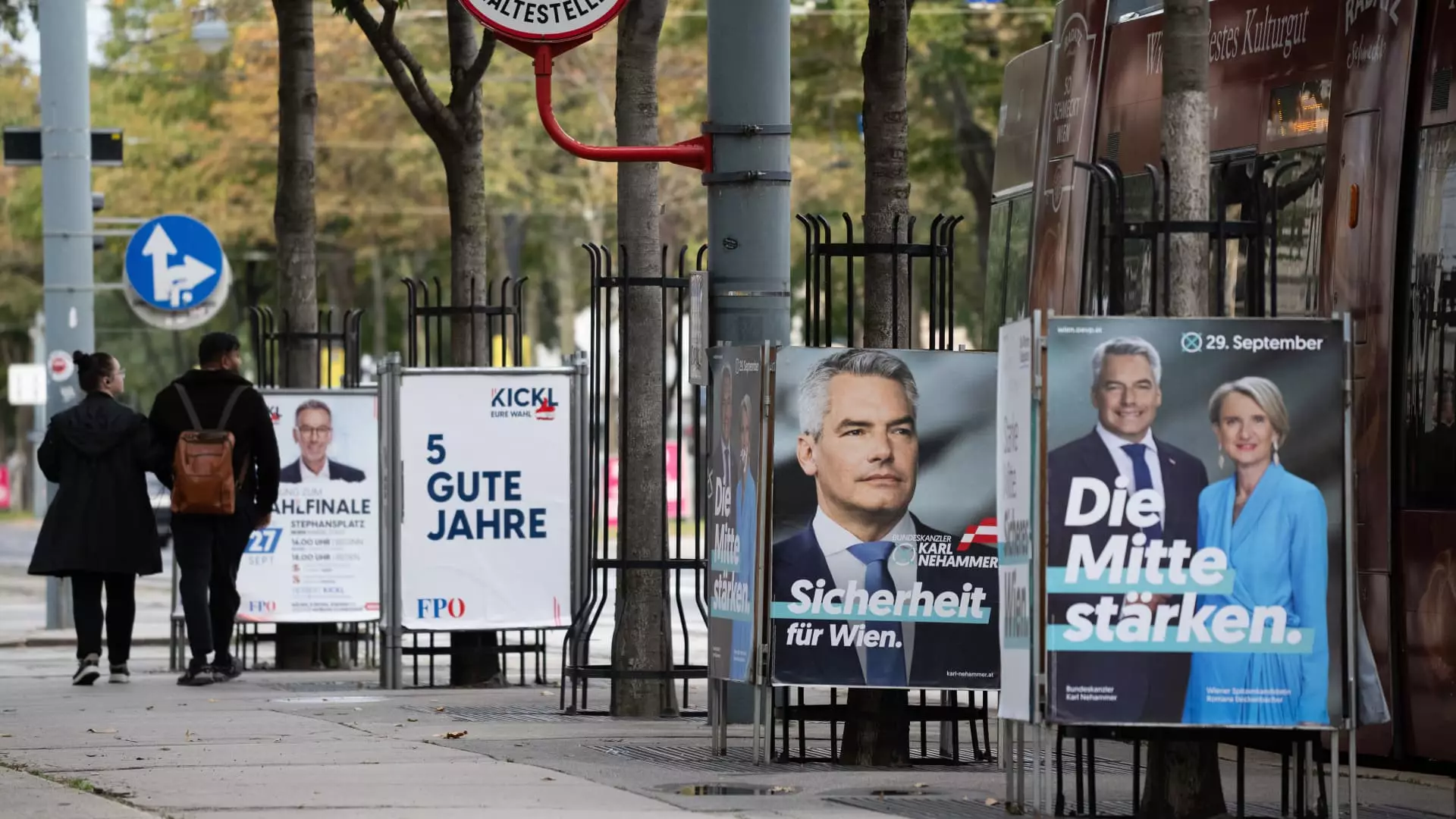The recent elections in Austria have sparked significant concern not merely within the nation’s borders but across Europe as well. With the far-right Freedom Party (FPÖ) emerging as the frontrunner in the polls, a political landscape traditionally dominated by moderate parties appears to be on the brink of transformation. This development could have far-reaching consequences, affecting both domestic governance and the broader geopolitical dynamics between the West and Russia.
The Emergence of the FPÖ
Exit polls indicate that the FPÖ, a party with roots tracing back to former Nazi affiliates, secured approximately 29.1% of the vote, surpassing the ruling Austrian People’s Party (ÖVP), which garnered around 26.2%. The Social Democratic Party of Austria trailed at about 20.4%. The rise of the FPÖ illustrates a distressing trend wherein populist, anti-immigrant sentiments are gaining traction across Europe. This shift is alarming when considered alongside the party’s controversial past and its leadership under Herbert Kickl, a figure who has drawn parallels to historical ideologies that many would prefer to leave behind.
What makes this outcome notable is not just the percentage of votes but its implications. The FPÖ’s ascent signifies a potential normalization of far-right politics, a reality that many European nations are facing concurrently. As Austria’s party system contemplates a coalition, the prospect of aligning with the FPÖ has been widely dismissed by other political entities. This set-up ensures that even if the FPÖ emerges with the most votes, achieving a stable governance structure could prove elusive.
Although the FPÖ has recorded a commendable electoral performance, the absence of an outright majority means coalition-building becomes imperative. The primary challenge lies in the prevailing reluctance of other parties to align with the FPÖ, which has been labeled controversial at best. The ÖVP, previously the FPÖ’s partner in a government that ended scandalously, seems hesitant to embrace the far-right party anew, despite the shared context of their past coalition.
Chancellor Karl Nehammer’s firm rejection of coalition talks with Kickl indicates a broader unease within the traditional political landscape about normalizing relations with parties characterized by extremist views. However, with Kickl now at the helm of Austria’s largest party, the political dynamics in Austria—and potentially in Europe—are set for a reevaluation.
Geopolitical Considerations: Austria at a Crossroads
Austria’s geographic and historical position as a neutral state offers a unique perspective in today’s fractious political climate. It has served as a diplomatic arena and a refuge for political discourse, hosting conversations that could steer the future of European geopolitics. However, as the FPÖ aligns itself more closely with anti-Western sentiments and advocates for a cessation of support for Ukraine, the country risks jeopardizing its traditional stance of neutrality.
The FPÖ’s proposed policies surrounding immigration, particularly the idea of “remigration,” could further exacerbate societal tensions and stimulate xenophobia, thus fracturing the nation’s commitment to inclusivity. The consequences of these ideologies extend beyond borders, posing challenges to European unity in the face of collective issues such as migration and economic volatility.
The FPÖ’s rise is not an isolated incident but aligns with a broader trend observed throughout Europe, where far-right factions have made significant electoral gains in countries such as Germany, France, and the Netherlands. These movements thrive on dissatisfaction toward traditional political structures, often capitalizing on economic woes, immigration crises, and a general sense of disillusionment among the populace.
As the FPÖ celebrates its electoral success, it serves as a warning shot for democracies that may be grappling with similar attitudes. The normalization of extremist views can disrupt social cohesion and hinder the progress made toward a more inclusive Europe. The FPÖ’s platform is reminiscent of the rhetoric employed by many far-right parties: it scapegoats immigrants and foreigners while undermining support for international solidarity.
The electoral outcome in Austria encapsulates a moment of reckoning for the nation and signals possible shifts across the continent. The rise of the FPÖ may decide the country’s political future and serve as a harbinger of a more fragmented Europe. As Austria navigates this politically charged landscape, the implications of its electoral choice will be observed closely, with critical lessons poised to affect the direction of European politics in the years to come. The path forward remains uncertain, as traditional parties grapple with an electorate increasingly drawn toward far-right ideologies, challenging foundational European values of unity and democracy.

Leave a Reply